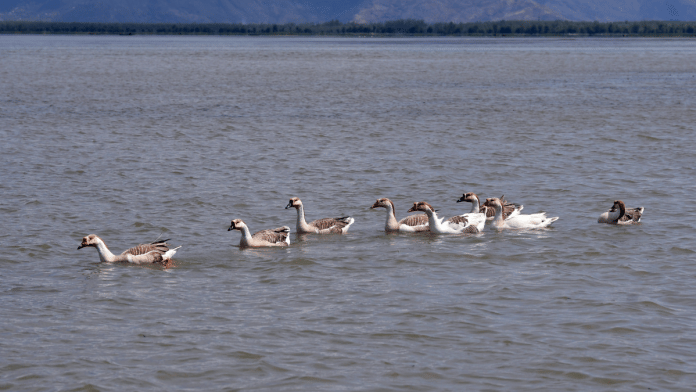New Delhi: In early December, images of five men standing on the banks of Wular Lake, the second-largest freshwater lake in South Asia and a Wetland of International Importance under the Ramsar Convention, brandishing shotguns and donning cartridge belts, were caught on CCTV cameras. One of the men was seen keenly looking at his fallen prey from a distance. His friends cheered on while preparing the gun for their turn to take out migratory birds.
These images were circulated widely on social media and were enough to spring the local authorities into action.
On 11 December, the wildlife protection department, along with the Jammu and Kashmir’s wetland division, conducted a series of raids in the Srinagar area against illegal poaching activities at Wular Lake. The raids resulted in the confiscation of guns, cartridges, hunting gear and decoys—all allegedly used by poachers for recreational hunts around the lake during winter.
“We were receiving videos of these hunting trips on our social media platforms. This prompted us to survey CCTV footage and get leads on the hunters,” a senior official from the J&K wildlife protection department told ThePrint.
The official said that while surveillance and action have increased since the local administration set up cameras around the lake last year, the problem of recreational hunting of migratory birds has been a challenge in the area for years.
“There are many VIP houseboats and tourist centres in this part of the city, which organise these winter hunts for tourists. Despite the ban on hunting, these activities have been rampant,” the official said.
Also Read: Sikkim’s war on GLOF. Monks, shamans, and scientists are all in the fight
Ramsar site at risk
Wular Lake, a recognised Wetland of International Importance since 1990, is not just home to several local and migratory birds, including Greylag Goose, Common Teal, Pygmy Goose and White Stork, but is also a point of absorption of flood water and aids groundwater recharge.
Environmentalists highlight that the water body is ecologically extremely significant for the region. But in recent years, Wular has become a victim of government and public neglect.
“There has been incessant waste dumping around the lake. There is also large-scale dredging and unauthorised construction activities that have gone unchecked,” said Mir Jeelani, an environmental activist in Srinagar.
Jeelani explained that years of neglect is visible in the way the once majestic lake looks today. Initially occupying an area of 20,200 hectares, the Wular Lake has shrunk to merely 2400 ha recently, according to central government records. Government maps show that the lake now only occupies a maximum length of 16 km and a width of 7.6 km.
In 2020, satellite images from the National Aeronautics and Space Administration (NASA) showed how Wular shrunk over the years. Using the satellite images, NASA scientists also confirmed that the lake had turned eutrophic—a state of influx in nutrients and sediments, which leads to a rapid growth of algae and vegetation in a waterbody and thereby, causes a decline of oxygen levels.
Over a period, eutrophication can negatively impact water quality, reduce biodiversity, and kill fish and other aquatic life around the water body.
Poaching around Wular
To add to Wular’s already pitiable plight, the lake is also plagued by poachers who come out every winter to hunt migratory birds around the lake waters.
Officials said that during winter—usually around October or November—when migratory birds start arriving in Kashmir, tour operators and VIP houseboat owners pitch hunting and poaching to attract tourists.
These locals often provide guns, cartridges and the entire hunting gear to tourists and act as their guides during “hunting trips”. According to forest department officials, many houseboat owners also offer to cook the hunted birds or arrange for the kill to be made into souvenirs for their guests.
Despite a strict ban on poaching under the Wildlife Protection Act, which also requires residents around lakes with rich wildlife and bird populations to surrender private weapons before the police, poaching activities have continued in the Bandipora district, where the Wular Lake is located.
Officials said these activities were mostly carried out early in the morning or after sunset to avoid detection. Such illegal activities had started impacting the seasonal bird count, they added.
In 2023, the Wular Conservation Management Authority (WUCMA) set up surveillance cameras along the banks of the lake to stop poaching. The agency has also created an anti-poaching squad to add another layer to the surveillance in the area.
“We are taking a multi-pronged approach to tackling poaching. Along with CCTV cameras, we have also set up watchtowers from where our anti-poaching teams will monitor illegal activities. This will be a deterrent,” WUCMA coordinator Mudasir Mehmood had said at a media address last year.
These watchtowers will also act as a vantage point for bird watchers and tourists for spotting birds.
Mehmood claimed they have observed increased attendance of migratory birds since upping scrutiny. “Since we increased surveillance, we have observed at least four to five new varieties of migratory birds last season,” the WUCMA coordinator said.
(Edited by Tony Rai)
Also Read: Delhi hasn’t had a ‘good’ air day in over a year, you may have to wait till 2025






